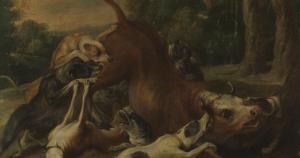 Animal suffering has always bothered me and cruelty to animals was viewed as a barbaric, utterly unjustifiable evil by my parents. I was raised with Black Beauty and my first summer camp gave us a big dose of Saint Francis (with a trippy film).
Animal suffering has always bothered me and cruelty to animals was viewed as a barbaric, utterly unjustifiable evil by my parents. I was raised with Black Beauty and my first summer camp gave us a big dose of Saint Francis (with a trippy film).
As a result, when Steve Baughman, lawyer and social critic, asked some Christians what we thought of God’s tolerating thousands of animals suffering in the Australian fires, I thought he deserved an answer.
My answer did not satisfy the good Councilor and he responded with a series of very good questions and the following:
Animals suffer as a matter of nature. Predation means most of them die by tooth and claw. (Painfully.) That seems to be much more consistent with an uncaring universe than with a loving God. Yes, creative minds can come up with a model that saves the God theory. But so what?
It is true that creative minds can save most theories from most things. This can be done by creating ad Hoc explanations for problems, but like a bad television show whose fans ret-con series difficulties, the solutions are often weak. Even a world class writer can fail when he tries a creative ret-con. Maybe Sherlock Holmes really did not die wrestling with Moriarty, but the explanation for why faithful Watson spent years believing he was dead is not Sir Arthur’s best moment as a writer.
Is this what I have done with animal suffering?
No.
Perhaps, a full account of how I first began to think about animal redemption would help show why this is so. The reason I have always hated animal suffering is that my Christian family, following the constant teaching of the church, taught me to love and care for animals. My childhood beliefs about animals did not begin with the “problem of animal pain,” but from looking at the goodness of animals in creation. My first theological question about animals was, given how awesome they are, would they be in Heaven?
My dad’s response was that most of theological reflection (understandably) centers on God and the nature of God. Christianity is God centered. Scriptures themselves reveal God to humanity and the ultimate revelation is in Jesus. We begin any question with the God and his nature. God is love. God is also just. God is the creator of the cosmos and He loves each element of creation calling it good, including the animals. When in the story of Noah he is pictured as cleansing the earth, because of human depravity, he makes provision for humanity and the animals. This includes “unclean” animals that cannot be used for food!
Since the Scriptures and most of the teachings of the Church focus on people and our relationship with God, there is not much said about animals. God, one assumes, has His own relationship to our fellow animals that are not human and that is their business.
Given the nature of God, love and justice, and God’s revealed love for His creation, Dad saw no reason to think my pet would not be in “heaven” (meaning the new heavens and new earth). Why not? We begin knowing God loves and saves animals. Every image we have of eternity includes animals. We have no worked out dogmatic theology of animals, but we have a worked out theology of God and God’s relationship with creation.
My thoughts about animals began with Narnia and CS Lewis. They included Lewis’ provision for the redemption of the animal and human relationship in my favorite science fiction novel That Hideous Strength. Only later as I began to think about philosophy did I come to the conclusion that animal pain and suffering was also a problem for theology. I then used exactly the same tools I already had to address that complaint.
In short, the approach to animal pain and suffering is not ad Hoc, an attempt to save the Faith from a criticism, but flows out of a Christian’s basic beliefs about God’s nature and creation. Theologians have developed a theology of creation before criticisms related to animal suffering that can be used (naturally) to answer the particular criticism. Nothing in my response to Baughman was added to Christianity to answer him, I merely used what Christians already believed about God and creation to respond to his concern.
A new application of old beliefs when presented with a newish question is not a “creative mind” saving the God theory.
As for the earlier part of his complaint, “predation” and “tooth and claw” as universal or near universal experiences of animals seems an exaggeration and mere rhetoric. Not all animals prey on other animals. Not all animals (creatures?) have sophisticated enough neural systems to experience pain. Most animals do not die as prey. Most animals that can register pain may not have sophisticated enough experiences of pain to register it as a continuous process. What is to think like a bat? To experience life as a bat? We do not know, but must be careful not merely to import how this would feel to us.
As fond as I am of Victorian literature, the Victorian picture of nature as red in tooth and claw may have made Empire builders feel better, but nature as a whole strikes me more as cooperation and good in terms of an ecosphere. We see lower life forms having events happen to them that would be horrific if they happened to us, but those life forms have no neural network and no way to experience pain. The cycle of life seems mostly good with some serious anomalies.
Many of those painful events are in the end (even from a secular point of view), the fault of the super-predator: man.
According to Christian theology, nature is broken and humankind keeps breaking it. We are seeing nature as it is, not as it should be. Creation remains good, just as each human retains the image of God, but the good is bent in all creation. The image is marred. As a result, bad things happen to good people. Animals suffer gratuitously.
There is a reason the Fathers and Mothers of the Church warned against too much consumption and urged us to live in harmony with nature. The Christian Tolkien, after all, sided with the trees while secular fantasists such as HG Wells were urging us to rip up nature and live in the plastic houses of the future. Too often humankind shows up in an ecosystem and makes a hash of it before understanding the delicate balance. We increase predation of higher animals (at times) by the killing of plants, fish, and lower “animals.”
We should cause as little animal suffering as possible, but often make the situation worse. Of course, none of this addresses the pain and suffering that does occur or what happens to animals when they do suffer from catastrophic problems. I suggested that this pain is redeemed, must be redeemed. The cosmos is vast and eternity is long. God will provide mercy, healing, and hope for all unjust suffering in a broken world.
In a follow up piece, I will address some specific questions from Baughman about the redemption of animals.
————————————
*Mr Baughman has been kind enough to write for Eidos. He took on professional sports twice and I responded twice. He has a standing invitation to follow up here on this topic.












